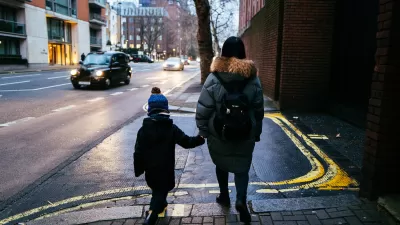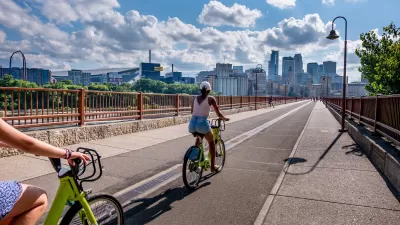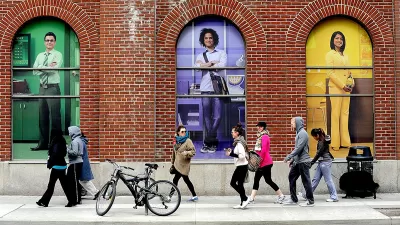Gas tax increases can mean more road funding, period, particularly where constitutional restrictions prohibit spending gas tax revenues on other modes, as exists in Pa.; yet all modes will benefit from the 28-cent gas tax increase legislation.
Angie Schmitt writes that transit will definitely benefit from the bill that Gov. Tom Corbett signed on Monday that is estimated to increase wholesale gas taxes by 28-cents over three years. This increase includes the elimination of the 12-cent state excise tax on gasoline.
Philadelphia transit agency SEPTA gets a big funding boost, enough to spare disastrous service cuts. Pittsburgh transit will also get some much welcome financial stability after years of uncertainty, fare hikes, and threats to service.
According to The Daily Pennsylvanian, the bill "will provide about $350 million in funding to SEPTA, which would have closed nine of its 13 regional rail lines by 2023 if it did not receive the extra funds." Read more about the "Doomsday Plan" the agency had prepared.
The below email from the Pittsburgh Post-Gazette explains how public transit received funding from the bill. Pennsylvania is one of 30 states that restricts gas tax revenues to road-only applications according to Brookings "Fueling Transportation Finance: A Primer on the Gas Tax" (PDF).
Transit will get funding from a variety of sources, but nothing from the Oil Company Franchise Tax. The Pa Turnpike currently pays PennDOT $450 million a year, $200 million of which goes to roads-bridges and $250 million to transit. The $200 million will be redirected to transit. Some "nonrestricted" vehicle fees that aren't constitutionally reserved for roads-bridges will go to transit, as will a share of the increases in traffic fines.
Walking and biking are also big winners, writes Sarah Stuart, whose group, PA Walks and Bikes, had been lobbying the legislature all year to ensure that active transportation funding would be in the bill.
As (PennDOT Secretary Barry) Schoch told advocates Monday night, “This is the biggest step forward for the bicycle and pedestrian modes of transportation in the history of Pennsylvania.”
Stuart lists four ways in which active transportation benefits, including:
- Sets an annual minimum of $2 million of that fund to be spent on bicycle and pedestrian facilities;
- Explicitly states that Pennsylvania’s comprehensive transportation system includes Pennsylvania’s “numerous bicycle and pedestrian facilities,” which will make it easier for bicycle/pedestrian projects to compete for highway funds.
Stuart credits all the groups working "with the Keystone Transportation Funding Coalition and the health groups that collaborated on Walk Ride PA" for the funding for active transportation.
According to the Pittsburgh Post-Gazette, the legislation "will result in a net increase in the state gasoline tax of 9.5 cents per gallon starting Jan. 1; another 9.7 cents for 2015; and at least 8 cents for 2017." It is anticipated that gas retailers will pass "all or most" of the tax to motorists, writes Dustin Hockensmith of The Patriot-News.
Ryan Holeywell of Governing writes that the new law "will eventually mean more than $2.3 billion annually in additional funds for transportation infrastructure."
FULL STORY: Pennsylvania Transportation Bill a “Dramatic Win” for Biking and Walking

Maui's Vacation Rental Debate Turns Ugly
Verbal attacks, misinformation campaigns and fistfights plague a high-stakes debate to convert thousands of vacation rentals into long-term housing.

Planetizen Federal Action Tracker
A weekly monitor of how Trump’s orders and actions are impacting planners and planning in America.

In Urban Planning, AI Prompting Could be the New Design Thinking
Creativity has long been key to great urban design. What if we see AI as our new creative partner?

Portland Raises Parking Fees to Pay for Street Maintenance
The city is struggling to bridge a massive budget gap at the Bureau of Transportation, which largely depleted its reserves during the Civd-19 pandemic.

Spokane Mayor Introduces Housing Reforms Package
Mayor Lisa Brown’s proposals include deferring or waiving some development fees to encourage more affordable housing development.

Houston Mayor Kills Another Bike Lane
The mayor rejected a proposed bike lane in the Montrose district in keeping with his pledge to maintain car lanes.
Urban Design for Planners 1: Software Tools
This six-course series explores essential urban design concepts using open source software and equips planners with the tools they need to participate fully in the urban design process.
Planning for Universal Design
Learn the tools for implementing Universal Design in planning regulations.
Gallatin County Department of Planning & Community Development
Heyer Gruel & Associates PA
JM Goldson LLC
City of Camden Redevelopment Agency
City of Astoria
Transportation Research & Education Center (TREC) at Portland State University
Jefferson Parish Government
Camden Redevelopment Agency
City of Claremont





























